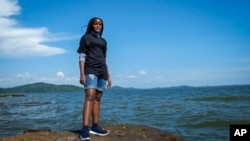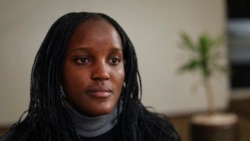The capital of Uganda coughs itself awake on weekdays under a soft blanket of smog. Kampala's hills come into sharper focus as the morning rush of minibuses and motorbikes fades. It is this East African city that one of the world's most well-known climate activists, Vanessa Nakate, calls home.
The 25-year-old's rise in profile has been quick. Not even three years have passed since she set out with relatives in Kampala to stage her first, modest protest over how the world is treating its only planet.
In an interview this week with The Associated Press — which last year drew international attention and Nakate's dismay by cropping her from a photo — she reflected on the whirlwind. She spoke of her disappointment in the outcome of the U.N. climate talks in Scotland and what she and other young activists plan for the year to come.
"We expected the leaders to rise up for the people, to rise up for the planet" at the talks known as COP26, she said. Instead, the world could be on a pathway to warm 2.4 degrees Celsius over pre-industrial times.
That's well above the goal of limiting warming to 1.5 degrees Celsius — and would be "a death sentence for so many communities on the front lines of the climate crisis," Nakate said.
Globally, the signs are dire. The Arctic is warming three times faster than the rest of the planet. The dramatic drop in carbon dioxide emissions from COVID-19 pandemic lockdowns has almost disappeared. This year, forests burned in Siberia's weakening permafrost, while record-shattering heatwaves in Canada and the U.S. Pacific Northwest and deadly flooding in Europe brought the climate threat home to some who once thought they could outspend it.
But many of the most-affected communities are in Africa, whose 1.3 billion people contribute the least to global emissions, less than 4%, but stand to suffer from them most.
That suffering, in some cases, has already begun: Deadly drought fells wildlife and livestock in parts of East Africa, water scarcity hits areas in West and Southern Africa, and hunger affects many millions of people, from Madagascar to Somalia, as a result.
And yet the $100 billion in financing per year promised by richer nations to help developing countries deal with the coming catastrophe has not appeared.
"We cannot adapt to starvation," Nakate said, her voice soft but firm as the introvert in her gives way to the convictions that have brought her this far. "We cannot adapt to extinction, we cannot adapt to lost cultures, lost traditions, to lost histories, and the climate crisis is taking all of these things away."
The next big climate conference will be in Africa, in Egypt, a chance for the spotlight to fall squarely on the continent.
It will be a test for activists and negotiators from Africa's 54 countries who have long jostled for space at global climate events.
"Many times, activists in Africa have been called missing voices. But we are not missing," Nakate said. "We are present, we are available, we are just unheard."
She watched as some activists from African countries faced the challenges of securing funding, accreditation or access to COVID-19 vaccinations as they sought to attend COP26. She has spoken of feeling erased herself when she was cropped out of an AP photo of climate activists last year at the World Economic Forum. The AP apologized for its error in judgment and the pain it caused her.
But it is not enough to simply listen to Africa's climate activists, Nakate said this week. People with power must act on those demands.
"We don't want to just hear sweet phrases from them, sweet commitments," she said. "Commitments will not change the planet, pledges will not stop the suffering of people."
Specifically, Nakate said, drastic action is needed by the leaders in government and business that continue to fund the extraction of fossil fuels, like coal and oil.
She chose not to call out anyone by name, but when asked whether Ugandan President Yoweri Museveni, in power since 1986, had replied to a letter she wrote about a controversial oil pipeline project to ship crude from Uganda to neighboring Tanzania, she said no.
In fact, the 77-year-old leader has never been in contact with Nakate, who became one of the world's most well-known Ugandans not long after graduating from university with a business degree and becoming inspired by climate activism.
In her recent book, A Bigger Picture, Nakate reflects on how leaders' decisions on climate have real-life consequences far beyond the data that often dominate the conversation.
She worries about how farmers who lose their crops to climate shocks will feed their families, and how lost income can force children out of school and young women into early marriage.
"This isn't just about us wanting a reduction in greenhouse gas emissions," Nakate said. "We want justice that centers the protection of the planet and the protection of the people because the climate crisis exacerbates poverty first of all. We cannot eradicate poverty if climate change is pushing millions of people into extreme poverty and keeping them in poverty traps."
Asked how young climate activists can make sure that they are central to decision-making worldwide, Nakate expressed confidence that they are making themselves heard, creating their own platforms on social media and elsewhere.
"If the table is not given to you, you make one for yourself," she said — a message she could well tweet to her 230,000-plus followers.
In 2022, Nakate's work will be closer to home as she pursues a project to provide schools in Uganda with solar panels and eco-friendly cookstoves to reduce the amount of firewood consumed.
"I can't believe how fast this journey has been," she said as she realized that within weeks it will be the third anniversary of her first climate protest in Kampala. "Activism can be very hard, a lot of work, but it takes love and grace to continue to speak."
It also takes a certain hope, she said, and as a born-again Christian she finds that hope in God. It helps her believe that "the future you're fighting for is actually possible and you can achieve it."






